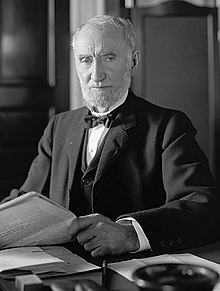
Back چوزيف جورنى كانون ARZ جوزف قورنی کانون AZB Joseph Gurney Cannon German Joseph Gurney Cannon Spanish Joseph Gurney Cannon Finnish Joseph Gurney Cannon Italian Joseph Gurney Cannon Portuguese Joseph Gurney Cannon Romanian Кэннон, Джозеф Герни Russian Joseph Gurney Cannon Swedish
Joseph Gurney Cannon | |
|---|---|
 Cannon c. 1909–1923 | |
| 35th Speaker of the United States House of Representatives | |
| In office November 9, 1903 – March 3, 1911 | |
| Preceded by | David B. Henderson |
| Succeeded by | Champ Clark |
| Leader of the House Republican Conference | |
| In office November 9, 1903 – March 3, 1911 | |
| Preceded by | David B. Henderson |
| Succeeded by | James Robert Mann |
| Chairman of the House Republican Conference | |
| In office March 4, 1899 – March 3, 1903 | |
| Speaker | David B. Henderson |
| Preceded by | Charles H. Grosvenor |
| Succeeded by | William P. Hepburn |
| In office March 4, 1883 – March 3, 1889 | |
| Speaker | John G. Carlisle |
| Preceded by | George M. Robeson |
| Succeeded by | Thomas J. Henderson |
| Member of the U.S. House of Representatives from Illinois | |
| In office March 4, 1873 – March 3, 1891 | |
| Preceded by | District created |
| Succeeded by | Samuel T. Busey |
| Constituency | 14th district (1873–1883) 15th district (1883–1891) |
| In office March 4, 1893 – March 3, 1913 | |
| Preceded by | Samuel T. Busey |
| Succeeded by | Frank Trimble O'Hair |
| Constituency | 15th district (1893–1895) 12th district (1895–1903) 18th district (1903–1913) |
| In office March 4, 1915 – March 3, 1923 | |
| Preceded by | Frank Trimble O'Hair |
| Succeeded by | William P. Holaday |
| Constituency | 18th district |
| Personal details | |
| Born | May 7, 1836 Guilford County, North Carolina, U.S. |
| Died | November 12, 1926 (aged 90) Danville, Illinois, U.S. |
| Political party | Republican |
| Spouse |
Mary P. Reed (m. 1862) |
| Children | 2 |
| Alma mater | University of Cincinnati |
| Profession | Politician • lawyer |
| Signature | |
Joseph Gurney Cannon (May 7, 1836 – November 12, 1926) was an American politician from Illinois and leader of the Republican Party. Cannon represented parts of Illinois in the United States House of Representatives for twenty-three non-consecutive terms between 1873 and 1923; upon his retirement, he was the longest serving member of the United States Congress ever. From 1903 to 1911, he presided as Speaker of the House, becoming the most powerful speaker in United States history.[1]
As the Speaker during most of the presidencies of Theodore Roosevelt and William Howard Taft, Cannon was an obstacle to the progressive policies advanced by Roosevelt and later abandoned by Taft. A revolt against Cannon's authority as Speaker, led by George W. Norris, was a contributing factor to the Republican Party split in the elections of 1910 and 1912 and led to significant reforms to the House rules.
The Cannon House Office Building, the oldest congressional office building, was named for him in 1962.